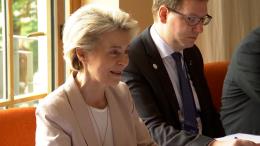The group assures that the sanctions “will not affect” food security
June 28. (EUROPA PRESS) –
The member countries of the G7 have announced this Tuesday that they will allocate 4,500 million dollars (about 4,200 million euros) to the protection of “the most vulnerable” against hunger and malnutrition in the context of the war in Ukraine and have asked Russia “urgently” unlock Black Sea ports to facilitate grain exports.
In a statement after a summit held in Germany, the G7 has clarified that the aid already amounts to 14,000 million (about 13,200 million euros) to guarantee food security at a global level in the midst of the armed conflict between Russia and Ukraine.
Thus, they have insisted that Moscow must allow the reopening of ports “without any conditions” and put an end to “vital” port facilities, as well as to the infrastructure for the transport of grain. “We ask that they stop illegally appropriating this food and Ukrainian equipment…which prevents effective production and export,” she said.
As they have clarified, the food issue can only be understood as a “geopolitically motivated attack against food security”, for which they have emphasized that “they will continue to support Ukraine so that it continues to produce food and agricultural products for the next season from harvest”.
“We are committed to Ukrainian farmers so that they gain access to medicines, veterinarians and essential agricultural products,” says the document, which supports the efforts led by the United Nations to achieve a “safe maritime corridor” through the Black Sea.
In this sense, they have assured that they will continue working to “identify illegalities and prevent Russia from continuing with its illegal seizures.” “We are going to guarantee that the sanctions packages do not affect food and allow the free transit of agricultural products, including those from Russia,” they declared.
In addition, they have advocated tackling the shortage of fertilizers and have expressed their support for the use of synthetic alternatives and have urged those partners who have large grain reserves to “not distort the markets” and support the World Food Program.
“We ask all countries to avoid storing food excessively, which can lead to an increase in prices”, they continued, but not without first reaffirming their commitment to “opening up the markets” and underlining the importance of “avoiding unjustified restrictive measures that may increase market volatility and thus food insecurity”.
“We will fight against any speculative behavior that could endanger food security or access to food for the most vulnerable countries or populations,” said the leaders of the group, made up of Germany, Canada, the United States, France, Italy, Japan and United Kingdom.
PLAN INTERNATIONAL ASKS THE G7 TO FULFILL ITS COMMITMENTS
This same Tuesday, the NGO Plan International has called on the G7 to fulfill its commitments in the context of the current food crisis and has asked for an increase in funding to tackle the problem.
According to data from 2021, some 26 million children under the age of five suffer from malnutrition, of which five million are at risk of dying due to this situation.
Thus, the organization has lamented that armed conflicts such as the war in Ukraine, the impact of the climate crisis and the economic repercussions of COVID-19 on food and energy prices have exacerbated these effects.
Plan International has warned in a statement that girls often suffer the worst consequences “due to discrimination, as they are often the last to eat and receive less food.”
In relation to the G7 summit, he recalled that the member countries already adopted a pact for the prevention of famine and the humanitarian crisis last year and denounced that the points of the agreement have not yet been fulfilled.
“This G7 summit offers a key opportunity to decisively address the world hunger emergency and avoid the worst scenario. We cannot afford the cost of another missed opportunity and we ask governments to make the funding commitments to address this emergency decisively and urgently”, said Concha López, general director of Plan International.
In this sense, they have asked governments to contribute to cover the current financing deficit of 20,325 million euros to prevent almost 49 million people from being on the brink of famine and to help protect some 137 million people.
681441.1.260.149.20220628134223
















Add Comment